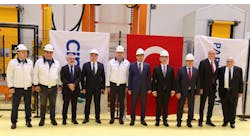"Brewers can focus on the product, not running around turning valves off and on. Automation expands what people can do." Milwaukee Brewing Co.’s Jim McCabe on the benefits of partnering with Rockwell Automation.
From his start as a home brewer 22 years ago in an industrial beer town, through starting a successful brewpub to evolving a 75,000 bbl/year brewery into a “boutique beverage producer,” Jim McCabe, founder, Milwaukee Brewing Co. (MKE) stayed in touch with his roots as a system integrator for Rockwell Automation.
“In Milwaukee, we have the agriculture, the ingredients and the equipment, but also the human resources,” McCabe said at the Rockwell Automation Process Solutions User Group (PSUG) meeting, held this week in Chicago. “Expanding on those is my passion. It’s hard to call it work.”
McCabe founded Milwaukee Ale House restaurant in 1997 with 1,200 bbl/year capacity. In 2007, MKE, capacity 12,000 bbl/year, kegged its first brew. In 2017, MKE relocated and expanded to 75,000 bbl/year.
“Microbrew and craft beer aren’t the same thing,” McCabe said. “Micro is a government definition of size. Two kegs equal a 31-gallon barrel, and a microbrewery has a maximum capacity of 15,000 bbl/year.”
Craft is more about qualities that come from brewer knowledge, experience and supervision. “When I started craft brewing, I was a system integrator for Rockwell Automation, integrating PLC-5s by day and brewing in my basement at night,” McCabe said. “In the original pub/brewery, we didn’t use automation, but I stayed in touch with Rockwell Automation.” The MKE packaging facility was two blocks from the Rockwell Automation plant clock tower in Milwaukee.
The original MKE brewery used “a very manual process—little automation but a fair amount of instrumentation,” McCabe said.
Human values and automation
“We focus on human values with sustainability, consistency and efficiency,” McCabe said. “For sustainability, we have the world’s best fresh water resources right outside the building [Lake Michigan]. We try to buy everything locally and minimize our impact, though beer is heavy when it comes to shipping.”
“Beer production is a technical process, combining art, science and engineering, and consistency becomes a challenge as you try to grow and add packaging and shipping. And efficiency is increasingly important as more people enter the industry.”
According to CraftBeer.com, there are currently 7,480 active small and independent brewing operations in the U.S., and about 3,000 in planning. The industry is expected to grow at 14.1% CAGR from 2019 to 2024, but has seen only 4% craft brewer production volume growth in the first half of 2019.
“People are still crazy enough to keep opening breweries and 4% growth is still healthy, but there will be winners and losers,” McCabe said.
Speed to market has become increasingly important. “The market has been growing quickly, but tastes change. We started with amber beer, and now no one talks about it,” McCabe said. “Now, you see seltzer made in breweries because now, all the alcohol isn’t legally required to be derived from malt. In just two years, the seltzer category is rivalling the craft brew market.”
So now, to sustainability, consistency and efficiency, MKE needed to add versatility. So, about four years ago, when MKE began running out of capacity, it decided to build a new brewery on a larger site with a clean sheet of paper. “We could do what we want in a brand-new facility,” McCabe said. “It was a chance to optimize for the future, to build my dream brewery.”
MKE involved Rockwell Automation “right out of the gate, and while we thought we knew what we wanted, we learned a lot,” McCabe said. The new brewery has increased capacity, sustainability and efficiency, and now, versatility, thanks to Rockwell Automation. “It still looks like a brewery and we do craft brewing, but it’s also a boutique beverage producer,” McCabe said.
FactoryTalk Craft Brew
The automation system runs Rockwell Automation FactoryTalk Craft Brew. It’s designed for beer, “but we can change anything we want, which gives us versatility,” McCabe said. “For example, we’ve modified the clean-in-place (CIP Skid) module to apply it on other pieces of equipment, such as filling and packing.”
Plantwide connectivity has been extended to a variety of supplied equipment including Sprinkman Brewing Systems and KHS filling system hardware. “All that stuff is now connected back to the control room and communicates effectively,” said McCabe.
Today, the brewery is a lot larger, and, “You can’t yell all the way down to the guy at the filler,” McCabe said. “We use iPads, and we can communicate just as if we ran all the way across the plant and were standing in front of that equipment.”
Everybody has access to data. “We are still a bunch of bearded brewing guys who like to sample the product, but we’re also FDA regulated,” McCabe said. “We need Homeland Security traceability for everything that comes into the plant.”
With FactoryTalk Craft Brew, “Brewers can focus on the product, not running around turning valves off and on. Automation expands what people can do. State-of-the-art automation gives them the ability to focus on the art.”
“We’re set up to multitask. We can run batches one right behind another, of the same or different product, in any sequence the equipment can handle.”
In numbers, the facility has reduced its average brew time from 6.5 to 2.5 hours. Malt consumption per batch, typically 3,000 to 5,000 lbs, has been reduced by as much as 500 lbs. And average yield has increased from 70% to more than 90%, McCabe said. “Lately, 93%, because you’re not flipping things by hand.”
“It’s changing the way we think about our facility,” McCabe said. “We’ve been running one shift, but we just booked seltzer business that will double our volume. We never ran seltzer before, but our equipment and system give both us and our partner confidence.
“We sleep better at night, knowing we’re making a consistent product that will be shipped all over, and when our customers drink it, it will be what it’s expected to be.”





